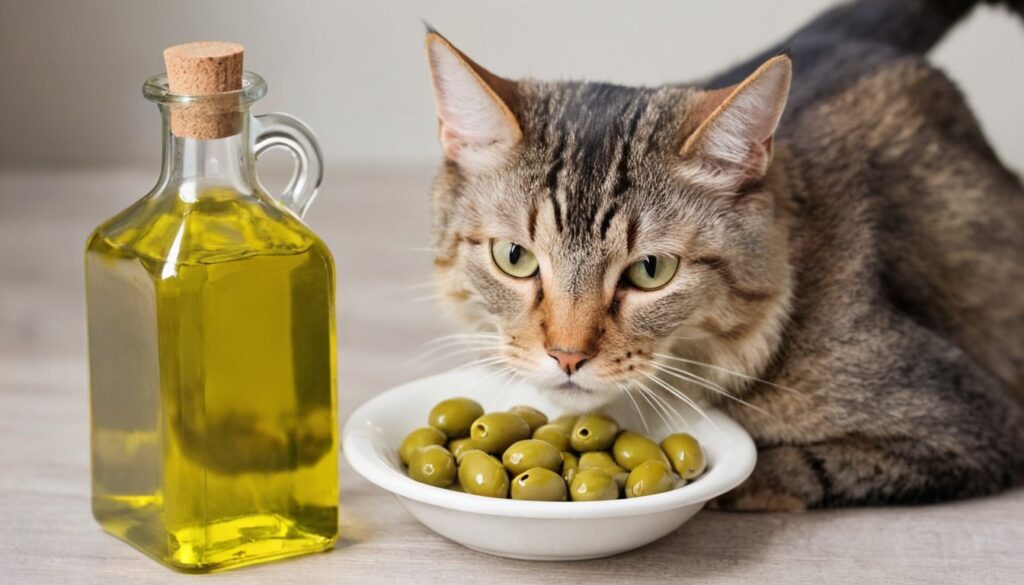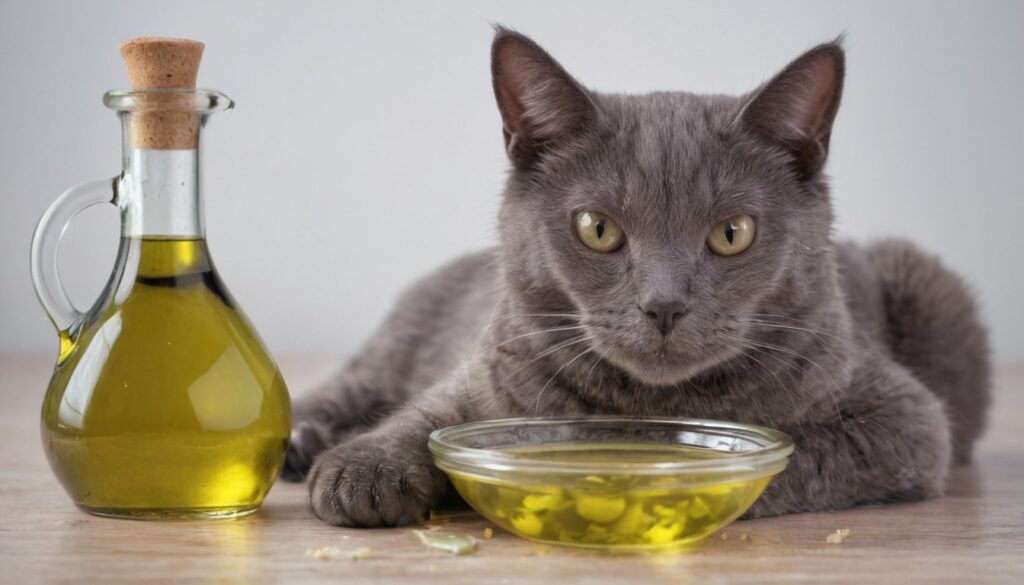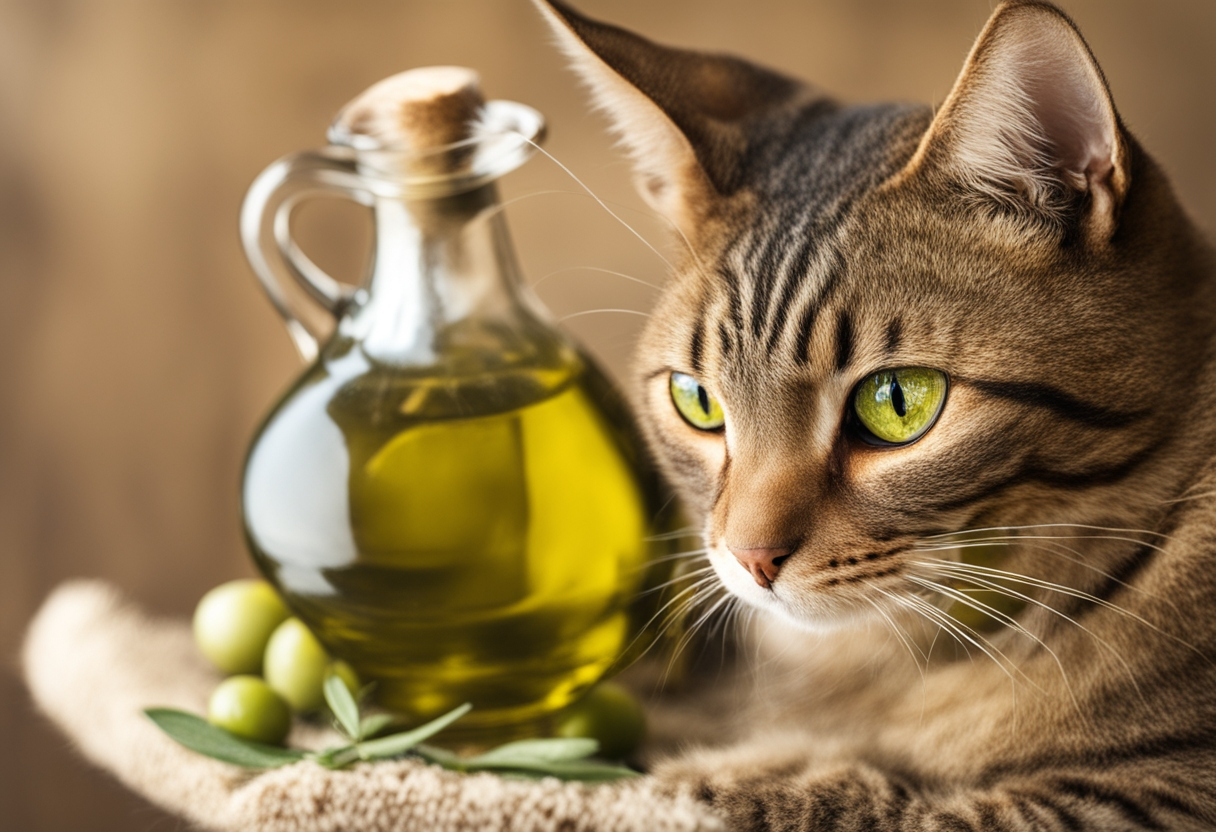If you’re a cat owner, you may have wondered whether olive oil is safe and beneficial for your feline friend. In this article, we will explore the nutritional benefits of olive oil for cats and discuss how much they can have.
We’ll also take a look at the potential risks of feeding olive oil to cats and provide some tips for incorporating it into their diet. We’ll examine the signs of olive oil allergies in cats and explore how this oil can benefit their overall health. We’ll touch on some alternative oils for cats, such as coconut oil, fish oil, and flaxseed oil.
Whether you’re considering adding olive oil to your cat’s diet or are simply curious about its potential benefits, this article has all the information you need.
Can Cats Eat Olive Oil?
Olive oil is often touted for its health benefits, but can it be safely incorporated into a cat’s diet?
It is generally safe for cats to consume small amounts of olive oil, but it is important to be aware of potential risks and proper dosage. While it can benefit their coat and help with hairballs, overuse can result in digestive problems and weight gain. It is recommended to use olive oil in moderation, with a maximum of 1/4 teaspoon per day for an average-sized cat. This approach ensures that cats can reap the benefits of olive oil while minimizing any potential negative effects.
What Are the Nutritional Benefits of Olive Oil for Cats?

Olive oil offers various nutritional benefits for cats, including essential omega-3 fatty acids, vitamins, and minerals that support overall feline health.
Olive oil contains antioxidants that can reduce inflammation and prevent cellular damage in cats. Additionally, the healthy fats in olive oil can contribute to a shiny coat and healthy skin for felines.
The presence of vitamin E in olive oil also helps bolster a cat’s immune system, aiding in fighting off infections and promoting overall health. As a natural dietary supplement, olive oil can be a valuable addition to a cat’s diet, supporting their well-being.
How Much Olive Oil Can Cats Have?
Determining the appropriate dosage of olive oil for cats is crucial, ensuring it is administered in moderation and integrated into their feeding regimen responsibly.
Feeding your feline friend with olive oil can indeed offer certain health benefits, but it’s essential to consult your veterinarian to identify the right dosage for your cat’s specific needs.
A general recommendation is to mix a small amount of olive oil into their food, ensuring not to exceed a few drops per meal.
While olive oil can contribute to a healthy coat and aid in digestion, overfeeding can lead to adverse effects.
Hence, always prioritize moderation and responsible feeding practices when incorporating olive oil into your cat’s diet.
What Are the Risks of Feeding Olive Oil to Cats?
Feeding olive oil to cats carries potential risks, including adverse side effects such as gastrointestinal issues and allergic reactions that need to be carefully considered.
There are potential risks associated with feeding cats olive oil. This is because cats may have difficulty digesting it, resulting in gastrointestinal issues such as diarrhea, vomiting, or discomfort. Additionally, some cats may be allergic to olive oil, causing symptoms like itching, swelling, or difficulty breathing. It’s crucial for cat owners to understand these potential side effects and consult with a veterinarian before adding olive oil to their pet’s diet.
What Are the Best Ways to Incorporate Olive Oil into a Cat’s Diet?

Incorporating olive oil into a cat’s diet can be done effectively through various methods, ensuring optimal absorption and storage of high-quality products from reputable brands.
One method for integrating olive oil into a cat’s diet is by mixing a small amount with their regular food. This ensures that the cat will consume the oil without any resistance.
Another method is to apply a small amount on their fur; cats are known to groom themselves, allowing them to ingest the oil naturally. When considering absorption, it’s important to choose extra virgin olive oil for its high-quality and digestibility.
Proper storage is essential to maintain its freshness; storing it in a cool, dark place in a sealed container is ideal. Opting for reputable brands ensures that the oil is free from any additives or impurities, promoting the cat’s well-being.
Mixing with Wet Food
Mixing olive oil with wet cat food can serve as an effective method of incorporating it as a dietary supplement, enhancing the nutritional value of the meal.
Olive oil is a great source of essential fatty acids that can benefit your cat’s skin and coat. These fatty acids, including omega-3 and omega-6, can also support your feline’s immune system, heart, and overall well-being.
In addition to its nutritional benefits, olive oil can also provide added moisture for cats who may not drink enough water. This can help with hydration and contribute to your cat’s overall health and vitality. So, not only will your cat enjoy mealtime, but they will also be getting important nutrients.
Drizzling Over Dry Food
Drizzling olive oil over dry cat food can contribute to improving the coat and skin health of felines, providing them with essential nutrients and healthy fats.
This addition can help alleviate dry, itchy skin and promote a glossy, lustrous coat. The healthy fats in olive oil may also aid in reducing shedding and minimizing dandruff in cats.
In addition, incorporating olive oil into their diet can potentially support overall immune function and boost energy levels. It’s important to note that moderation is key, as excessive consumption of olive oil can lead to weight gain. Consulting a veterinarian before making changes to your pet’s diet is always a wise decision.
Using as a Treat
Using olive oil as an occasional treat for cats can help alleviate issues such as hairballs and constipation, providing them with a natural remedy for these common concerns.
Incorporating a small amount of olive oil into your cat’s diet can support the movement of hairballs through their digestive system, reducing the likelihood of discomfort or blockages.
The lubricating properties of olive oil can help ease constipation in cats, promoting regular bowel movements and overall digestive health. By offering this natural and effective solution, you can contribute to your feline friend’s well-being in a simple and wholesome way.
What Are the Signs of Olive Oil Allergies in Cats?
Recognizing the signs of olive oil allergies in cats is essential, especially concerning any adverse reactions that may manifest on their coat or skin.
Symptoms of olive oil allergies in cats can include itching, redness, or irritation on their skin or fur. Pay attention to any changes in their coat texture or appearance, such as dryness or flakiness.
Cats may also exhibit excessive grooming or scratching to alleviate discomfort. It’s important to monitor their skin and fur regularly for any signs of allergic reactions to olive oil, so you can promptly address and alleviate any potential discomfort for your feline companion.
How Can Olive Oil Benefit a Cat’s Health?
Olive oil can significantly benefit a cat’s health by addressing skin conditions, reducing inflammation, and supporting a robust immune system.
This natural remedy provides essential fatty acids, like omega-3 and omega-6, that help maintain a cat’s healthy skin and coat.
The anti-inflammatory properties of olive oil can aid in alleviating discomfort from conditions such as arthritis. The antioxidants in olive oil contribute to bolstering a cat’s immune defenses, promoting overall well-being and vitality.
Improves Skin and Coat Health
Incorporating olive oil into a cat’s diet can lead to improved skin and coat health, thanks to the presence of healthy fats and polyphenols that nurture feline wellness.
Olive oil is a great source of healthy fats that can keep a cat’s skin well-moisturized, preventing dryness and irritation. Its polyphenols, known for their antioxidant properties, can also protect the skin from environmental damage and promote a shiny, lustrous coat. Additionally, the anti-inflammatory effects of polyphenols can help manage skin conditions in cats, promoting overall skin and coat health.
Aids in Digestion
The inclusion of olive oil in a cat’s diet can aid in digestion, addressing potential gastrointestinal issues and promoting hydration, thus benefiting their overall well-being.
This natural oil contains monounsaturated fats, which can help to lubricate the digestive system and may alleviate constipation. The gentle nature of olive oil on the stomach lining makes it a suitable option for cats with sensitive digestive systems.
Olive oil’s hydrating properties can support the absorption of essential nutrients and promote overall hydration, contributing to a healthy and well-functioning digestive system for cats.
Helps with Weight Management
Olive oil can assist in weight management for cats by positively impacting their metabolism and promoting joint health, contributing to their overall vitality.
Olive oil is a great source of essential fatty acids that can improve metabolism and aid in weight control for cats. Its anti-inflammatory properties can also help alleviate joint discomfort, promoting better mobility and overall well-being. By incorporating moderate amounts of olive oil into their diet, pet owners can effectively manage their cats’ weight and support their joint health.
What Are Some Alternative Oils for Cats?
Apart from olive oil, there are several alternative oils that can be beneficial for cats, such as coconut oil, fish oil, and flaxseed oil, each offering unique advantages for feline wellness.
Coconut oil is rich in medium-chain fatty acids, which can support a cat’s immune system and promote a healthy coat. Fish oil, with its omega-3 fatty acids, provides anti-inflammatory benefits and contributes to heart and joint health.
Additionally, flaxseed oil, high in omega-3 and omega-6 fatty acids, aids in maintaining healthy skin and a glossy coat for your feline companion. By integrating these alternative oils into your cat’s diet in appropriate amounts, you can enhance their overall well-being and ensure they have a shiny, healthy coat.
Coconut Oil
Coconut oil can provide cats with various benefits, including fur enhancement, oral health support, and aid in digestion, making it a valuable addition to their dietary regimen.
This natural oil is rich in medium-chain fatty acids, which can nourish a cat’s skin and coat, leading to lustrous, glossy fur.
Coconut oil has antibacterial and antiviral properties that can promote oral health by reducing harmful bacteria in the mouth. When consumed in moderation, it can also aid in digestion by soothing intestinal inflammation and improving nutrient absorption.
These combined benefits make coconut oil a versatile and beneficial supplement for feline well-being.
Fish Oil
Incorporating fish oil into a cat’s diet can contribute to their heart health, brain function, and renal well-being, thanks to the essential omega-3 fatty acids it provides.
Omega-3 fatty acids, such as EPA and DHA, play a vital role in supporting the cardiovascular system by reducing inflammation and promoting healthy blood flow. These essential nutrients also support cognitive function, aiding in maintaining a sharp mind as cats age.
The benefits of omega-3s extend to renal function as well, as they can help support kidney health and function. By including fish oil in a cat’s diet, these important aspects of feline well-being can be addressed, promoting a healthier and happier life for your furry friend.
Flaxseed Oil
Flaxseed oil is beneficial for cats due to its omega-6 fatty acids, which support joint health, anti-inflammatory properties, and immune system function, contributing to their overall well-being.
Omega-6 fatty acids found in flaxseed oil have been linked to improved skin and coat health in cats. The anti-inflammatory properties of these fatty acids can also help alleviate discomfort in cats with arthritis or other joint issues.
The immune system support provided by omega-6 fatty acids can aid in combating common feline health issues. Including flaxseed oil in a cat’s diet can be a valuable way to promote their health and vitality.

